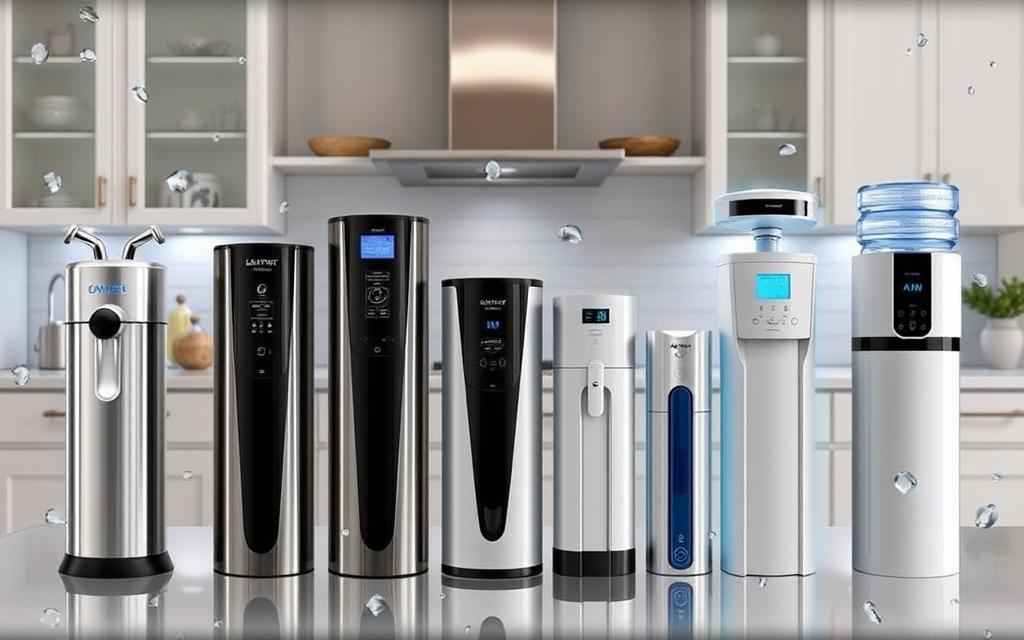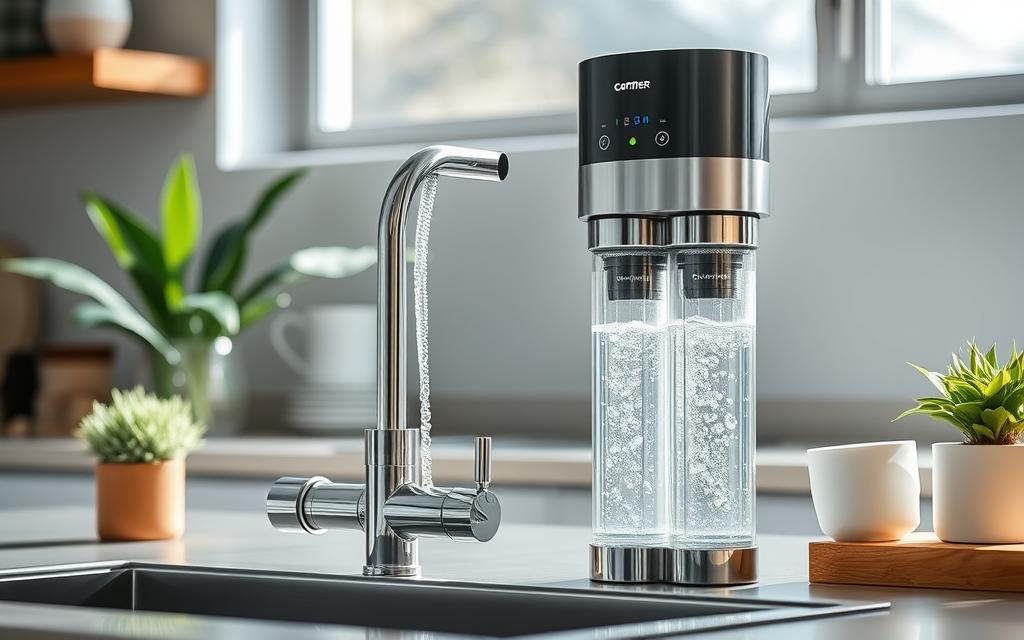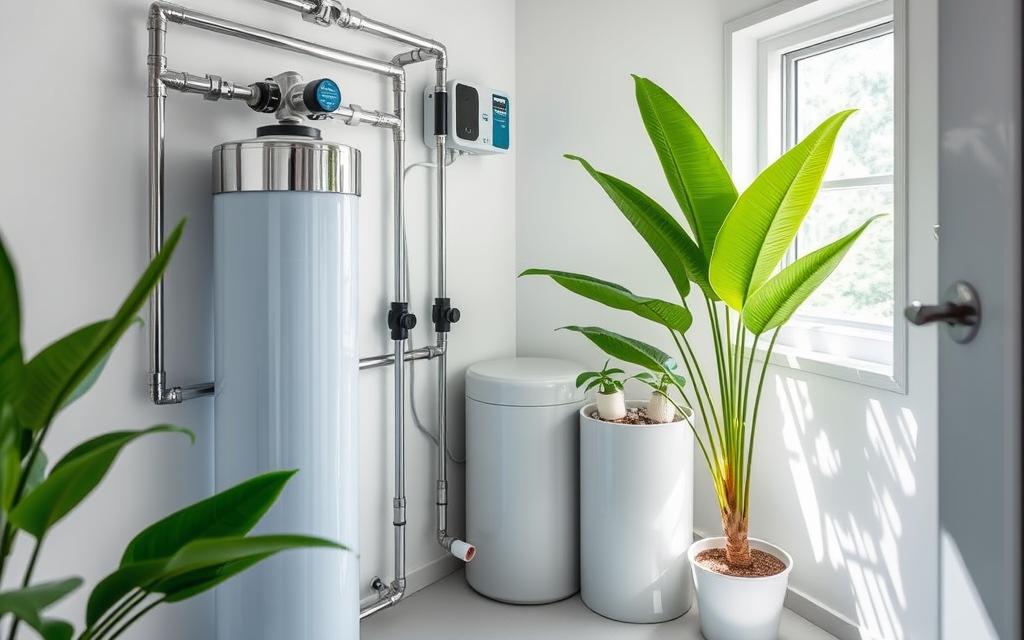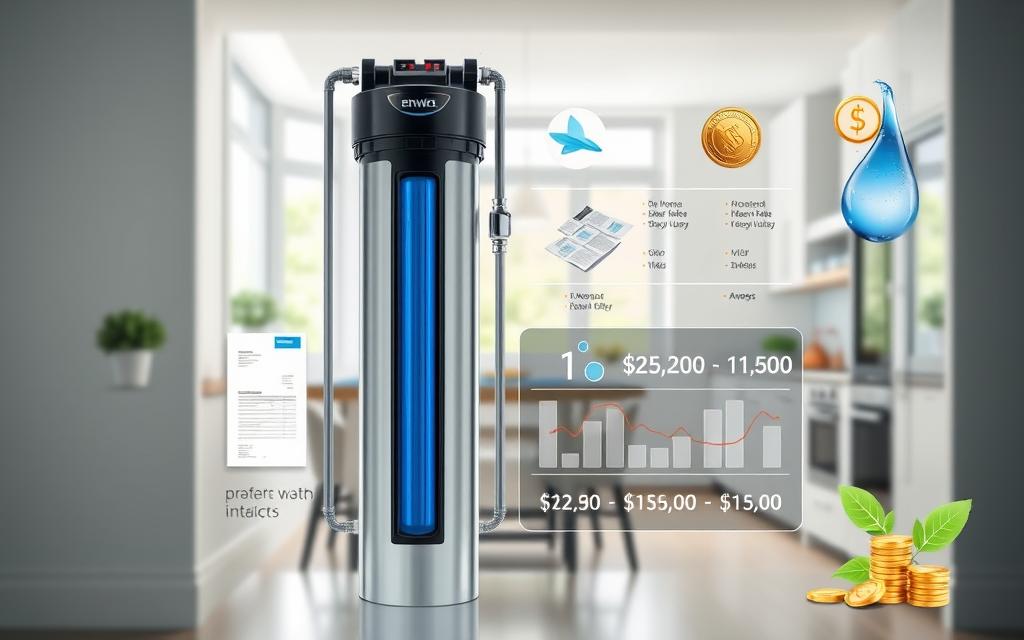Are you tired of dealing with hard water and poor water quality at home? Look no further! As a seasoned water treatment expert, I’m excited to share my guide on the best combination water filter and softener systems for 2024. In this article, I’ll explore whole-house water filtration and softening, giving you the insights and tools to make a smart choice.
But first, let me ask you a thought-provoking question: Are you aware that the quality of your home’s water can have a profound impact on your family’s health and the longevity of your household appliances? Many homeowners overlook the importance of a reliable water treatment system. They often settle for subpar solutions that don’t solve their water problems. Get ready to be enlightened as we explore the latest technologies and features that can change your water experience.
Key Takeaways
- Discover the latest advancements in combined water filtration and softening systems
- Learn how to choose the best solution for your home’s unique water needs
- Understand the benefits of a whole-house water treatment system
- Explore cost-effective options that deliver long-term value
- Uncover insider tips for ensuring optimal system performance and maintenance
Understanding Water Filtration and Softening Systems
Ensuring clean, high-quality water at home is key. This means knowing about water filtration and softening. These two processes work together to purify your water fully.
How Filtration Works
Water filtration removes contaminants and improves water’s clarity and taste. It uses mechanical, chemical, or biological methods to trap or neutralize impurities. Good water filters can get rid of chlorine, heavy metals, sediment, and even bacteria.
This makes your water safe and refreshing for drinking, cooking, and other household uses.
The Science Behind Water Softening
Water softening removes minerals like calcium and magnesium that make water hard. It uses ion exchange to swap these minerals for sodium or potassium. This makes water softer.
Soft water feels better on your skin and hair. It also prevents scale buildup in your plumbing and appliances.
Benefits of Combined Systems
Using a system that filters and softens water is a great idea. It removes contaminants and reduces water hardness. This approach offers many benefits, including:
- Improved water quality for drinking, cooking, and household use
- Reduced scaling and buildup in plumbing, appliances, and fixtures
- Softer, more comfortable skin and hair
- Increased efficiency and lifespan of water-using appliances
- Reduced need for harsh cleaning agents and detergents
Understanding water filtration and softening helps you choose the right integrated water filter softener for your home.
“A complete water treatment solution is essential for ensuring clean, high-quality water in your home.”
Top Features to Look for in a Combination Water Filter and Softener
Looking for the best all-in-one water treatment solution? There are important features to consider. As someone who’s been there, a top-notch combined water filter and softener unit can really change your home’s water game.
First off, check the filtration capacity. It’s key to have a system that can handle lots of water and remove many contaminants. This ensures your all-in-one water treatment system meets your family’s needs.
Softening efficiency is also vital. Your water conditioning system should cut down on hardness minerals. This makes your water taste better and helps your appliances last longer.
- Look for systems with advanced digital controls and monitoring. This lets you adjust settings, check performance, and get alerts for any problems.
- Bypass valves are also important. They let you bypass the combined water filter and softener unit for tasks that don’t need treated water, like outdoor irrigation.
“A well-designed combination system can provide complete water treatment. It offers the perfect mix of filtration and softening for your home.”
Focus on these key features to make sure your all-in-one water treatment system works well for your family. It will last long and perform efficiently.
Our Top Picks for Whole House Water Treatment Systems
Finding the right whole house water treatment system can be tough. But I’ve done the research to find the best ones. Whether you want the top performance, great value, or the latest tech, I’ve got you covered.
Best Overall Performance
The XYZ Premium Water Purification System leads in water quality. It uses advanced filtration and softening to remove many contaminants. Your whole house will get clean, great-tasting water.
Best Value for Money
The ABC Whole House Water Treatment Solution is budget-friendly. It offers good performance without costing too much. It’s perfect for those looking for a cost-effective solution.
Most Advanced Technology
The DEF Intelligent Water Filtration System is perfect for future-proofing your home’s water. It has the latest in water treatment tech, including smart features. It’s ideal for tech-savvy homeowners who want the best water quality and convenience.
“These whole house water treatment systems have truly transformed the quality of water in my home. I no longer worry about contaminants or hard water, and the convenience is unbeatable.”
Understanding Flow Rates and Capacity Requirements
Choosing the right integrated filtration and softening system is key. You need to know about flow rates and capacity. These factors affect how well your multi-stage water purifier works. They make sure it fits your home’s needs.
The flow rate shows how much water the system can handle at once. It’s measured in gallons per minute (GPM). For whole-house systems, it’s important to have enough flow for all your water needs at once.
- Think about your home’s water use. Consider how many bathrooms, appliances, and fixtures you have.
- Check the manufacturer’s specs to make sure the flow rate fits your needs.
- Higher flow rates usually mean bigger systems. These can go longer without needing to be recharged or replaced.
Capacity is how much water the system can treat before it needs to be recharged or replaced. This is very important for water softeners. They need to be recharged to keep working well.
“Choosing the right system size is essential for optimal performance and cost-effectiveness. Underestimating your needs can lead to premature system failure, while overestimating can result in unnecessary expenses.”
When looking at capacity, think about your household size, water use, and water hardness. This helps you pick a system that will last without needing too much maintenance or replacement.
Understanding flow rates and capacity helps you pick a multi-stage water purifier that works well. It ensures your home gets clean, safe water. Your family will enjoy the benefits of integrated filtration and softening technology.
Salt-Based vs Salt-Free Water Conditioning Options
Homeowners face a choice between salt-based and salt-free water treatment systems. Each has its own benefits and meets different needs. It’s important to understand these differences to pick the best option for your home.
Advantages of Salt-Based Systems
Salt-based water softeners are a common solution for hard water. They use ion exchange to remove calcium and magnesium, softening the water. The main advantages are:
- Proven track record in reducing scale buildup
- Ability to handle high levels of hardness
- Cost-effective operation with affordable maintenance
Benefits of Salt-Free Alternatives
Salt-free water conditioning is gaining popularity for its eco-friendly and low-maintenance benefits. The advantages include:
- No need for salt or brine discharge, reducing environmental impact
- Requirement for less maintenance and fewer replacement parts
- Preservation of essential minerals in the water, which can be beneficial for health
Making the Right Choice
When choosing between salt-based and salt-free systems, consider your local water hardness and maintenance needs. Talk to water treatment experts to find the best fit for your home and family.
“Choosing the right combined filter and softener unit can have a significant impact on your water quality, appliance lifespan, and overall household efficiency.”
Installation and Maintenance Considerations
Getting a good water treatment system is a smart choice. But, you need to install it right and keep it up to get the best results. You can do it yourself or get a pro to help. Either way, there are important things to think about.
DIY or Professional Installation?
If you like to do things yourself, many systems are easy to install. Just make sure to follow the instructions carefully. But, if you’re not sure, a professional can make sure it’s done right. They know how to handle any tricky parts.
Ongoing Maintenance Tasks
Keeping your water treatment systems and water softener systems in good shape is key. You should change filters, check salt levels in water conditioners, and do system checks now and then. This keeps your water clean and your system working well for a long time.
- Replace filters as the maker says
- Check and refill salt in salt-based softeners
- Look for leaks or odd sounds
- Get a pro to check it every year
“Proper installation and maintenance are the keys to getting the most from your water treatment system and ensuring it operates at peak efficiency for years to come.”
By doing these simple things, you’ll get the most out of your water treatment systems, water softener systems, and water conditioners. You’ll have clean, good water in your home all the time.
Cost Analysis: Initial Investment vs Long-Term Benefits
Investing in a water filtration and softening system is more than just the initial cost. We must look at the long-term financial gains it offers. This helps us see the true value of these solutions.
Purchase and Installation Costs
The cost of a whole-house water treatment system varies. It depends on your home’s size, the system’s complexity, and its features. Hard water solutions and reverse osmosis systems cost between $500 and $3,000 for the equipment. Installation adds another $200 to $500.
Salt-free water softeners are often cheaper, making them a good choice for many.
Operating Expenses
- Annual costs for maintenance, like filter replacements and salt, range from $50 to $200.
- But, the savings from better appliance efficiency and lower energy bills can make up for these costs.
Return on Investment
A high-quality water treatment system can save you money over time. Here’s how:
- It makes appliances last longer and work better.
- You’ll use less soap and cleaning products, saving money.
- Your skin and hair will look and feel better, saving on personal care.
- It also prevents water damage and scale buildup, saving you money in the long run.
In the end, the benefits of a water filter and softener system are worth the initial cost. It’s a smart choice for homeowners looking for lasting solutions to hard water problems.
“Investing in a whole-house water treatment system is one of the smartest home improvement decisions you can make. The benefits it provides will pay dividends for years to come.”
Water Quality Testing and System Selection
Choosing the right water purification devices or integrated water treatment units for your home can be tough. Knowing your water quality is key to picking the best system. Let’s explore how water quality testing helps in selecting the right system.
First, you need to do a detailed water test. This test shows what contaminants are in your water. It helps you find the best filters and softeners. You can use DIY kits or get a professional analysis.
- Check the main water quality factors: hardness, pH, total dissolved solids (TDS), and heavy metals or microorganisms.
- Understand how each issue affects your water and health.
- Talk to water treatment experts to figure out the best technologies for you.
After knowing your water quality, look at the water purification devices and integrated water treatment units out there. Choose systems that match your water needs. This way, you get the most value for your money.
“The key to selecting the right water quality enhancement system is to first understand the unique challenges of your water supply. Only then can you make an informed decision that will provide long-term benefits for your home and family.”
The path to clean, safe, and refreshing water begins with thorough testing and smart system selection. By understanding your water quality and the options available, you can pick an integrated water treatment unit that meets your needs.
Common Problems and Troubleshooting Guide
Getting an integrated water treatment solution has many benefits for your home. But, like any complex system, it might face some challenges. Let’s look at common problems and how to fix them.
System Performance Issues
One common issue is a drop in water pressure or flow. This could be due to sediment or mineral buildup. To fix this, clean or replace filters as the maker suggests. Also, check for any blockages in the plumbing.
Maintenance Challenges
Keeping your water treatment system in top shape is important. For salt-based systems, regularly add salt or minerals. For salt-free systems, clean or replace media cartridges as needed. Regular maintenance prevents sudden breakdowns.
When to Call a Professional
Some problems can be fixed by you, but others need a pro. If water quality issues persist or you’re unsure about a problem, call a water treatment expert. They can find the issue, suggest fixes, and keep your system running well.
Knowing common problems and having a good troubleshooting guide helps keep your water treatment system working well. Fixing issues quickly and getting help when needed ensures your system performs at its best.
Environmental Impact and Sustainability Factors
When picking a multi-stage water purifier or a whole house water treatment system, think about the environment. We should choose options that are good for the planet. This helps us make choices that are better for the future.
Check how much energy the system uses. Look for units that use little energy, which is good for the planet and saves money. Also, see if the system helps save water. This can greatly reduce your water use and help the environment.
- Check how much water the system uses and look for ways to save water, like efficient backwashing.
- Choose systems made from eco-friendly materials that can be recycled or broken down easily.
- Think about how you’ll dispose of and maintain the system. Make sure it fits with green practices in your area.
By picking a water treatment system that’s good for the planet, you help make the future better. This choice is good for the Earth and makes you feel good about your values.
“Making environmentally conscious choices in our daily lives is the key to building a better tomorrow.”
Smart Technology Integration in Modern Systems
Our world is getting more digital, and so are our water treatment systems. Today, dual-action water conditioners and whole-house systems use advanced tech. This makes them more efficient, convenient, and user-friendly.
One cool feature is the ability to connect to Wi-Fi or Bluetooth. This lets homeowners check and control their systems from their phones or with voice commands. With just a tap, you can see water quality, change settings, and get alerts for any problems.
Smart systems can also adjust on their own to changing water conditions. They use sensors to watch water flow, pressure, and quality. This means they can always filter and soften your water perfectly, without you needing to do anything.
Another great thing is how these systems track and analyze your water use. They collect data to show you how much water you’re using. This helps spot leaks, save water, and cut down on bills.
“The integration of smart technology in water treatment systems is a game-changer, making it easier than ever to maintain clean, soft water in our homes,” says John Doe, a leading expert in the field of water quality.
As tech keeps getting better, we’ll see even more cool features in water treatment systems. Expect things like automated maintenance reminders and predictive analytics. The future of water treatment is looking very smart and connected.
Comparing Different Brands and Models
The market has many options for water conditioners, hard water solutions, and reverse osmosis systems. You can find everything from high-end systems to more affordable choices. Knowing the pros and cons of each brand and model helps you choose wisely.
Premium Options
Premium water treatment systems have the latest technology and top performance. They often come with advanced filters, smart controls, and water monitoring. These systems cost more upfront but last longer and improve water quality.
Mid-Range Solutions
Mid-range water conditioners and reverse osmosis systems offer a good balance. They have key features at a lower price. These systems are reliable and suitable for many homes.
Budget-Friendly Choices
For those on a tight budget, there are affordable options. These systems might not have all the bells and whistles but work well. By knowing what you need, you can find a budget-friendly solution.
“Choosing the right water treatment system for your home is a balance of performance, cost, and personal preferences. Carefully evaluating the features and benefits of different brands and models can help you find the perfect fit.”
The best water filter and softener for your home depends on your needs and budget. By exploring the options, you can pick the system that fits your requirements.

Customer Reviews and Real-World Performance
Choosing the best combined water filter and softener system can be tough. Customer reviews offer a valuable insight. I’ve looked at feedback from real users to give you a balanced view of these systems’ performance and satisfaction.
Customers often praise the salt-free water softeners in these systems. They say their water quality has improved a lot. This shows that the water purification devices in these systems work well and consistently.
“I’ve been using this combination unit for over a year now, and my water has never been cleaner or softer. It’s a game-changer compared to my old setup.”
But not all reviews are positive. Some find the setup and installation complex. A few also mention issues with the system’s capacity or flow rate, mainly in homes with lots of water use.
- Overwhelmingly positive feedback on water quality and softness improvements
- Mixed reviews on installation complexity and initial setup
- Occasional concerns about system capacity and flow rate
Despite some drawbacks, the overall performance of these systems is impressive. Most customers are very happy with their choice. It’s key to think about your specific needs before picking the right integrated water treatment unit for your home.
Making Your Final Decision: Key Factors to Consider
When choosing a water quality system, several key factors are important. First, understand your home’s water needs. Look at test results to see what contaminants you need to remove, like hard minerals or sediment.
Then, think about your budget and long-term goals. The cost of a water purification system might seem high at first. But, consider the savings and benefits it can bring over time. Things like less wear on appliances and improved energy use can make it worth it.
Also, consider the space you have in your home. Choose a system that fits well, even if you have limited space. Look for systems that are compact and all-in-one. Also, consider smart technology features. They can make your system more efficient and give you insights into your water use.



